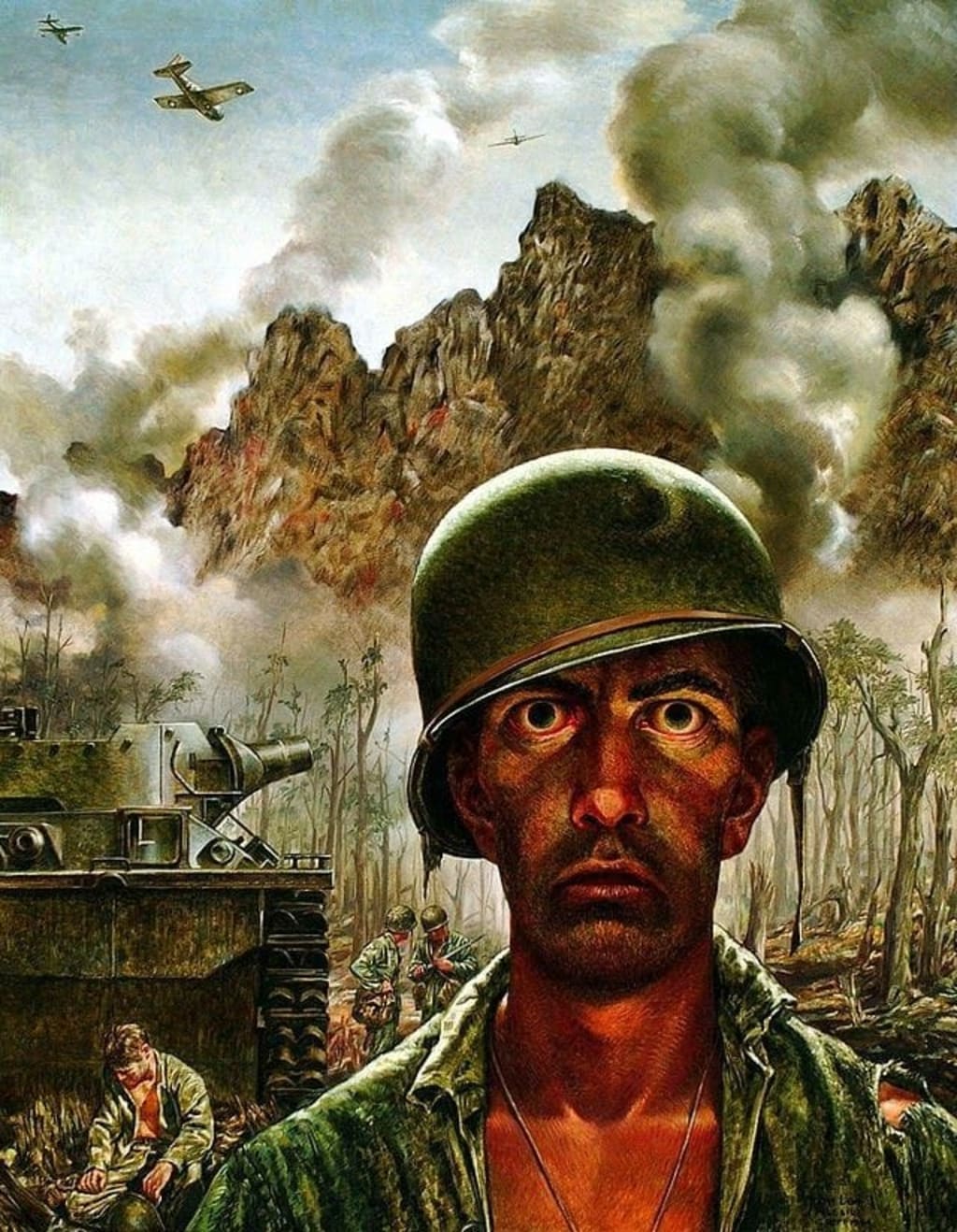landscape of World War I,
In the grim and tumultuous landscape of World War I, True story

In the grim and tumultuous landscape of World War I, where the echoes of artillery reverberated across desolate trenches and the very air seemed tainted with the stench of death, one soldier's story unfolded—a tale of courage, camaraderie, and the relentless struggle for survival.
The year was 1916, and the Western Front was a brutal theater of war, marked by the trenches that snaked their way through the European landscape. Private Thomas Reynolds, a young and spirited soldier from a small town in England, found himself thrust into this maelstrom of conflict. His wide-eyed innocence clashed with the harsh reality of war as he stepped onto the front lines for the first time.
Thomas, with his boyish charm and a heart full of dreams, had enlisted with a sense of duty and patriotism. The adventure he envisioned, however, quickly crumbled beneath the weight of mud-caked boots, the persistent chill, and the deafening symphony of artillery. The camaraderie of fellow soldiers became his refuge, a makeshift family forged in the crucible of adversity.
Assigned to the 56th Infantry Division, Thomas formed a bond with his comrades that transcended the horrors of the battlefield. Among them was Corporal William Harris, a grizzled veteran with a wry sense of humor that masked the scars etched into his soul by the war. Their friendship, forged in the crucible of shared hardship, became a beacon of humanity in the midst of the inhumanity surrounding them.
As the war unfolded, the trenches became both sanctuary and purgatory. A cacophony of voices, ranging from the tremulous whispers of those clinging to hope to the resigned sighs of men who had seen too much, filled the air. Trench warfare, with its ceaseless rain of bullets and artillery, tested the limits of human endurance.
In the eerie quiet between battles, Thomas would steal moments to pen letters to his family back home. His words, filled with a longing for normalcy and a touch of optimism, painted a stark contrast to the grim reality he faced. He concealed the horrors, choosing instead to share anecdotes of camaraderie and fleeting glimpses of beauty amidst the desolation.
The Battle of the Somme loomed on the horizon—a name whispered with a mixture of dread and resignation. The soldiers, their faces etched with a blend of fear and determination, prepared for a clash that would etch its mark on history. Thomas and his comrades, clad in drab khaki uniforms, faced the unknown with a stoic resolve.
July 1, 1916, dawned with an ominous gray sky, casting a pall over No Man's Land. The whistles blew, and the soldiers climbed over the trench walls, embarking on a journey into the heart of chaos. Machine gun fire rattled the air, and artillery shells burst in a symphony of destruction. The Battle of the Somme had begun.
As Thomas navigated the hellish landscape, a singular thought consumed him—the hope of emerging from this inferno unscathed. But hope was a fragile companion in the face of the relentless onslaught. The ground beneath his feet was a morass of mud and torn bodies, a grotesque testament to the cost of war.
In the midst of the chaos, Thomas glimpsed the humanity that war sought to strip away. A wounded enemy soldier, his eyes filled with a mix of terror and resignation, lay sprawled in the mud. Thomas hesitated, caught in a poignant moment of shared humanity. The enemy, like him, was just a pawn in a game of empires.
The Battle of the Somme unfolded as a symphony of tragedy. The fields became a graveyard of shattered dreams and broken bodies. Thomas and his comrades, bound by the unspoken oath of survival, pressed on through the mire, their faces etched with the weariness of men who had glimpsed the abyss.
Amidst the devastation, Thomas found himself grappling with the moral quandaries of war. The dichotomy of duty and humanity weighed heavily on his shoulders. The brutality of combat had stripped away the veneer of civility, leaving a raw and primal struggle for survival.
As the seasons changed and the war dragged on, the trenches bore witness to the erosion of hope. The once-optimistic letters home became more somber, reflecting the toll exacted by the unrelenting brutality. Corporal Harris, once a bastion of resilience, succumbed to the invisible wounds that festered within.
The camaraderie that had defined Thomas's war experience took on a bittersweet hue. Friends and comrades, whose laughter had once echoed through the trenches, became casualties of a war that seemed insatiable. Each loss carved a scar on Thomas's soul, a testament to the fragility of life in the face of unbridled violence.
In the winter of 1917, the trenches became a frozen purgatory. The biting cold gnawed at the soldiers' spirits, and the omnipresent mud solidified into an unforgiving quagmire. Yet, amidst the desolation, a spark of resilience flickered. Thomas and a handful of comrades clung to the belief that survival itself was a victory.
The Battle of Passchendaele unfolded as a macabre ballet of death. The landscape, already scarred by the specter of war, now bore witness to a relentless onslaught. Thomas, wearied but resolute, trudged through the muck alongside his dwindling band of brothers.
As the war dragged into its fourth year, the once-vivid dreams of glory had long faded. The trenches, once a crucible of camaraderie, now stood as a testament to the relentless attrition of the human spirit. The soldiers, mere pawns in a geopolitical chess game, bore witness to the futility of their sacrifice.
In the autumn of 1918, whispers of an armistice fluttered through the trenches like a fragile butterfly. The end was nigh, but victory tasted bitter on the lips of those who had survived. The scars, both seen and unseen, would endure long after the guns fell silent.
As the Armistice of Compiegne was signed, the guns fell silent on the Western Front. The war-weary soldiers emerged from the trenches, their eyes reflecting a mixture of disbelief and relief. Thomas, a survivor marked by the indelible imprint of war, returned to






Comments
There are no comments for this story
Be the first to respond and start the conversation.